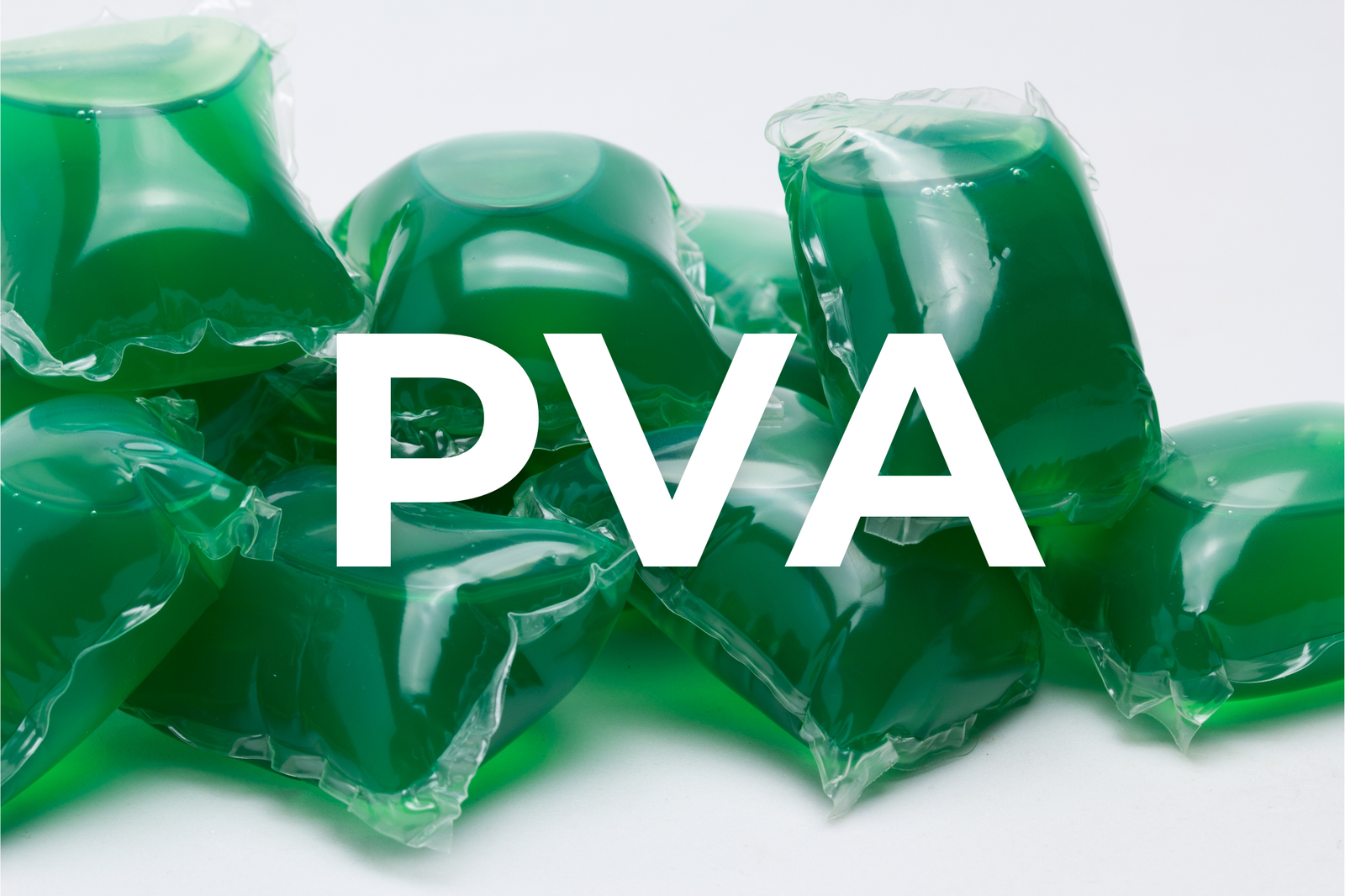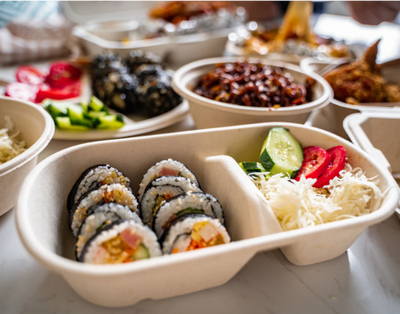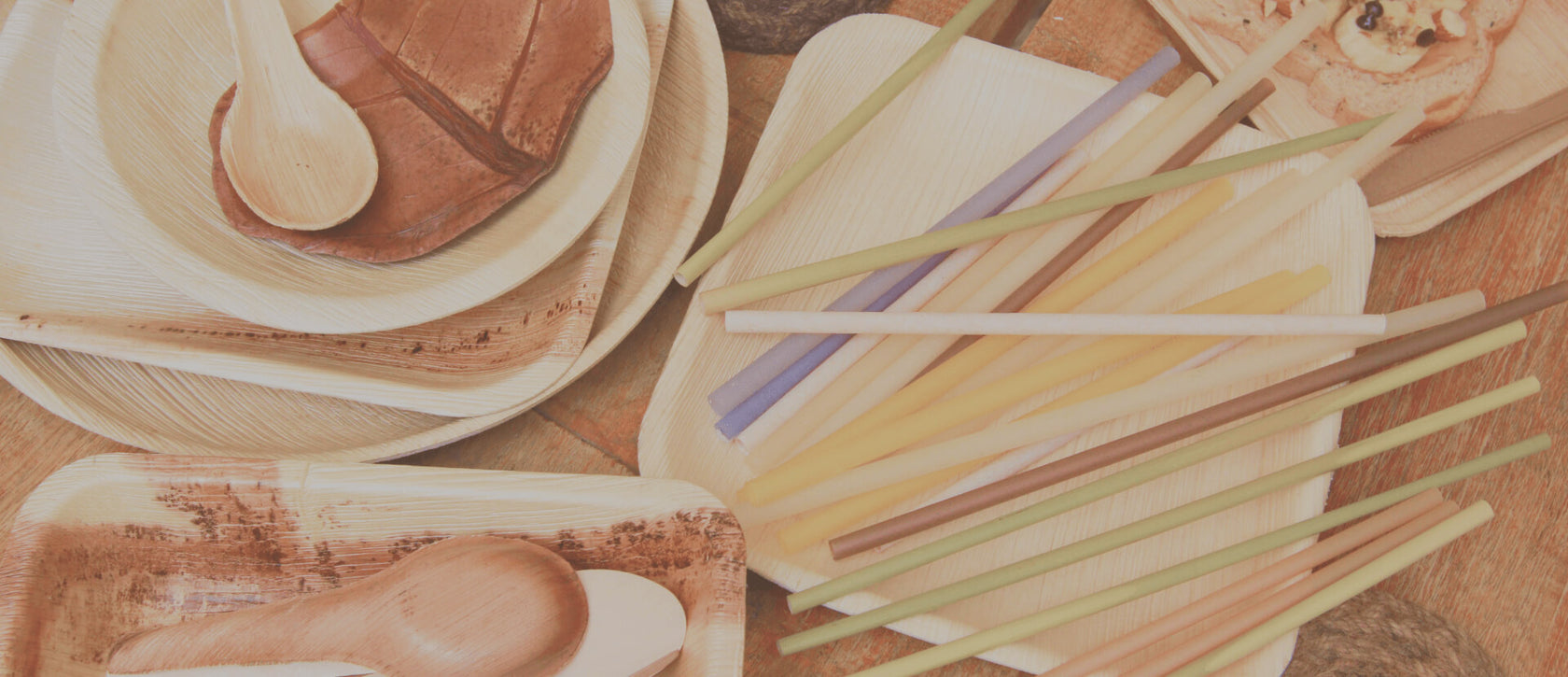Nhựa PVA, hay Polyvinyl Alcohol (PVOH), là một loại nhựa dễ phân hủy, có nguồn gốc từ axit axetic và vinyl alcohol. Với những tính chất đặc biệt, PVA đang trở thành một nguyên liệu quan trọng trong nhiều ngành công nghiệp và có tiềm năng phát triển lớn cho cuộc sống xanh. Trong bài viết này, EQUO sẽ giúp bạn hiểu rõ hơn nhựa PVA là gì, bao gồm khái niệm, tính chất, ứng dụng và tiềm năng phát triển trong tương lai.
1. Tổng quan về nhựa PVA
Nhựa PVA là một loại vật liệu tổng hợp có nhiều ứng dụng quan trọng trong đời sống. Nhờ những tính chất đặc biệt như khả năng tạo màng, kết dính tốt, dẻo dai và chống hóa chất, PVA được sử dụng trong nhiều lĩnh vực khác nhau như công nghiệp, xây dựng, dệt may, mỹ phẩm, y tế,...
1.1. Khái niệm
Nhựa PVA, hay còn gọi là Polyvinyl Alcohol (PVOH), là một loại polyme tổng hợp có khả năng hòa tan trong nước. Nó được tạo thành từ các đơn vị monomer vinyl alcohol liên kết với nhau.

Nguồn: Internet
>> Xem thêm:
- Thời Gian Nhựa Phân Hủy Trong Môi Trường Tự Nhiên Là Bao Lâu?
- Ống Hút PLA: Những Điều Bạn Nên Biết Về Nhựa Phân Hủy Sinh Học
- Hạt Vi Nhựa Là Gì? Tồn Tại Ở Đâu? Tác Hại Đến Sức Khỏe Thế Nào?
- 10 Ý Tưởng Sáng Tạo Bảo Vệ Môi Trường Độc Đáo Từ Tái Chế & Sản Xuất
- 10+ Vật Liệu Thay Thế Nhựa: Biện Pháp Hoàn Hảo Cho Môi Trường Và Con Người
1.2. Tính chất của nhựa PVA
Nhựa PVA có nhiều tính chất bao gồm:
- Tính tạo màng: PVA có khả năng tạo màng mỏng, dai và dẻo dai. Màng PVA có khả năng chống thấm khí, chống thấm nước và chống thấm dầu mỡ tốt.
- Khả năng kết dính: PVA có khả năng kết dính tốt với nhiều loại vật liệu khác nhau, bao gồm giấy, gỗ, kim loại, nhựa và vải.
- Tính dẻo dai: PVA có độ dẻo dai cao, giúp nó có thể chịu được va đập và ma sát tốt.
- Khả năng chống hóa chất: PVA có khả năng chống chịu tốt với nhiều loại hóa chất, bao gồm axit, kiềm và dung môi.

Nguồn: Internet
Với những tính chất đặc biệt như vậy, nhựa PVA sẽ tiếp tục đóng vai trò quan trọng trong nhiều lĩnh vực khác nhau, góp phần nâng cao chất lượng cuộc sống con người.
2. Ưu nhược điểm của nhựa PVA
Nhờ những ưu điểm như khả năng hòa tan trong nước và độ an toàn cao, PVA được sử dụng trong các lĩnh vực như sản xuất keo dán, dệt may, y tế,... Tuy nhiên, bên cạnh những ưu điểm, PVA cũng có một số nhược điểm cần được cân nhắc trước khi sử dụng.
2.1. Ưu điểm của nhựa PVA
Nhựa PVA được đánh giá cao bởi những ưu điểm sau:
- Khả năng hòa tan trong nước: PVA có thể hoà tan trong nước nhưng cần điều kiện cụ thể.
- Dễ sử dụng: Không cần pha thêm phần cứng, việc pha chế PVA đơn giản chỉ cần khuấy đều trong nước và điều chỉnh độ nhớt dễ dàng theo nhu cầu sử dụng.
- Khả năng chịu nhiệt: PVA có thể chịu nhiệt cao và ổn định trong môi trường nhiệt độ khắc nghiệt, giúp sản phẩm bền bỉ và tiết kiệm chi phí sửa chữa.

Nguồn: Internet
2.2. Nhược điểm của nhựa PVA
Mặc dù sở hữu nhiều ưu điểm nổi bật, nhựa PVA vẫn tồn tại một số hạn chế nhất định cần được cân nhắc trước khi sử dụng:
- Hạn chế về khả năng phân huỷ: Mặc dù được quảng cáo là có thể phân huỷ trong môi trường nước tuy nhiên quá trình này cần có điều kiện cụ thể. Để PVA phân hủy sinh học hoàn toàn, nó cần có sự hiện diện của các vi sinh vật và enzyme rất đặc hiệu để hỗ trợ quá trình phân hủy. Ngoài những vi sinh vật này, nó cũng đòi hỏi một khoảng thời gian nhất định trong cơ sở xử lý nước thải. Trên thực tế, nhựa PVA (hay các viên nước giặt mà chúng ta vẫn thường dùng) không có khả năng tự phân huỷ, chúng chỉ rã ra thành các vi nhựa và âm thầm gây ảnh hưởng đến môi trường.
- Nhạy cảm với độ ẩm: Do tính chất dễ hòa tan trong nước, nhựa PVA khá nhạy cảm với độ ẩm môi trường.
- Yêu cầu bảo quản đặc biệt: PVA cần được bảo quản trong môi trường kín khí hoặc là những nơi có thể kiểm soát tốt không khí.
- Giá thành cao: So với các loại nhựa phổ biến khác, giá thành của PVA cao hơn đáng kể. Điều này có thể là rào cản đối với một số người sử dụng, đặc biệt khi cần sử dụng số lượng lớn.

Nguồn: Internet
Khi lựa chọn nhựa PVA hãy ưu tiên sản phẩm có nguồn gốc rõ ràng, chất lượng tốt. Mặc dù nhựa PVA có nhiều ưu điểm, nhưng song song đó vẫn còn tồn tại nhiều nhược điểm. Các sản phẩm từ thiên nhiên vẫn là lựa chọn tối ưu cho môi trường. Nếu có thể, hãy ưu tiên sử dụng sản phẩm từ thiên nhiên để bảo vệ môi trường tốt nhất.
3. Tiềm năng phát triển của nhựa PVA
Nhựa PVA có tiềm năng phát triển lớn trong tương lai. Nhu cầu về nhựa PVA ngày càng tăng cao do người tiêu dùng ngày càng quan tâm đến sức khỏe và môi trường.
3.1. Nhu cầu thị trường ngày càng tăng
Theo Hiệp hội nhựa Việt Nam, thị trường nhựa PVA toàn cầu dự kiến sẽ đạt giá trị 2,5 tỷ USD vào năm 2028, với tốc độ tăng trưởng kép hàng năm (CAGR) là 6,5% từ năm 2023 đến năm 2028.
3.2. Tính ứng dụng rộng rãi
Nhựa PVA là một loại polymer có nhiều ứng dụng rộng rãi trong nhiều lĩnh vực khác nhau. Nhờ những ưu điểm như không độc hại, an toàn, và có khả năng phân hủy sinh học, PVA được xem là một loại vật liệu thân thiện với môi trường và ngày càng được sử dụng phổ biến.
Nhựa PVA đang nổi lên trong ngành công nghiệp hiện nay bởi tiềm năng phát triển vô cùng to lớn. Người tiêu dùng ngày càng quan tâm đến sức khỏe và mong muốn sử dụng các sản phẩm an toàn, không chứa hóa chất độc hại. Với những ưu điểm và ứng dụng thực tế, PVA là một vật liệu hứa hẹn sẽ đóng vai trò quan trọng trong cuộc sống của con người trong tương lai.
4. Ứng dụng nhựa PVA trong đời sống
Nhờ những đặc tính nổi bật như độ bền dai, khả năng hòa tan trong nước và tính an toàn cho người sử dụng, PVA được ứng dụng trong nhiều lĩnh vực khác nhau.
4.1. Bao bì thực phẩm
Nhựa PVA ngày càng được ưa chuộng trong sản xuất bao bì thực phẩm với nhiều ưu điểm hơn so với bao bì truyền thống. Với ít độc tố hơn, giảm nguy cơ nhiễm chất độc hại vào thực phẩm và khả năng phân hủy hoàn toàn trong môi trường tự nhiên, nhựa PVA góp phần giảm thiểu rác thải và bảo vệ môi trường. Đồng thời, nhựa PVA còn có độ bền cao và khả năng bảo quản thực phẩm tốt, giữ thực phẩm tươi ngon lâu hơn và phù hợp với đa dạng loại thực phẩm, mang lại sự tiện lợi và hiệu quả trong bảo quản.

Nguồn: Internet
Dù PVA được đánh giá cao bởi tính thân thiện với môi trường và khả năng phân hủy sinh học, nhưng để quá trình phân huỷ này có thể diễn ra lại cần rất nhiều điều kiện cụ thể khác. Hiện nay, hầu hết các nhà máy xử lý nước thải đều không có đủ điều kiện để phân huỷ hoàn toàn các sản phẩm làm từ PVA. Vì vậy phần lớn nhựa PVA vẫn còn tàn tích dưới dạng các vi nhựa rải rác khắp nơi gây ảnh hưởng nghiêm trọng đến môi trường.
Đó là lý do, các sản phẩm từ thiên nhiên, hoàn toàn không chứa nhựa luôn chiếm vị trí đặc biệt trong lòng người tiêu dùng. Những sản phẩm này đảm bảo sự an toàn cho sức khỏe và môi trường, cũng như khả năng giảm thiểu tác động tiêu cực đến hệ sinh thái.
EQUO: Bộ dụng cụ đựng thực phẩm bã mía an toàn cho cuộc sống xanh
EQUO tự hào là đơn vị tiên phong trong lĩnh vực sản xuất các sản phẩm đựng thực phẩm, ống hút, bộ dao dao, muỗng, nĩa,... từ nguyên liệu thiên nhiên như bã mía, cà phê, gạo, dừa,... Sản phẩm của EQUO đảm bảo an toàn cho sức khỏe, thân thiện với môi trường, không chứa nhựa nên có thể phân huỷ hoàn toàn trong môi trường tự nhiên.
Nhằm hỗ trợ các doanh nghiệp đang hoạt động trong lĩnh vực nhà hàng, ăn uống theo đuổi mục tiêu phát triển bền vững, EQUO cho ra dòng sản phẩm Bộ dụng cụ đựng thực phẩm được làm từ bã mía. Đây được xem là một nguồn nguyên liệu tự nhiên bền vững có thể tái tạo và phân huỷ một cách nhanh chóng. Đặc điểm nổi bật của sợi bã mía, nằm ở tính chất bền chắc, linh hoạt trong khả năng đóng gói, và chất lượng thoáng khí, không thấm nước. Bộ dụng cụ đựng thực phẩm của EQUO bao gồm hộp đựng, tô, dĩa, khay, và tất cả đều có những tính năng ưu việt như:
- Không chứa nhựa.
- Có thể ngâm trong nước 2 tiếng trở lên.
- Khả năng chống rỉ.
- Khả năng chịu nhiệt lên đến 100°C và an toàn khi sử dụng với lò vi sóng.
- Phân huỷ tự nhiên trong vòng 6 tháng.
Tất cả các sản phẩm đều được kiểm chứng lâm sàng và được cấp chứng chỉ BPI, BRCS, và DIN. Bộ dụng cụ đựng thực phẩm này được thiết kế với nhiều kích thước và dung tích khác nhau, phù hợp với mọi mục đích sử dụng như phục vụ đồ ăn mang đi, cắm trại, tiệc tùng và sự kiện ngoài trời.
Hãy cùng EQUO chung tay bảo vệ môi trường và hướng đến một tương lai xanh cho chính chúng ta và thế hệ sau! Mời bạn tham khảo thêm các sản phẩm khác của chúng tôi tại: https://shopequo.com/vi/collections

4.2. Keo dán
Nhựa PVA với kết cấu đặc biệt nên thường được dùng để làm keo dán gỗ, keo thủ công cho đến keo dán nhạy áp lực.
Keo PVA là loại keo phổ biến nhất để dán gỗ, từ các loại gỗ tự nhiên đến gỗ công nghiệp. Keo PVA có khả năng liên kết tốt với các loại gỗ khác nhau, tạo ra mối liên kết bền chắc và chịu nước tốt. Nó cũng được đánh giá cao vì tính thân thiện với môi trường, dễ vệ sinh và an toàn cho sức khỏe, đặc biệt là trong môi trường giáo dục.

Nguồn: Internet
4.3. Vật liệu xây dựng
Trong xây dựng, sơn nhựa PVA ngày càng phổ biến với nhiều ưu điểm so với sơn truyền thống. Khác với sơn gốc dầu, sơn nhựa PVA giải phóng ít hợp chất hữu cơ dễ bay hơi, cải thiện chất lượng không khí trong nhà và dễ lau chùi, ít độc hại hơn. Ngoài ra, nhựa PVA còn được sử dụng để sản xuất sơn tự phục hồi, có khả năng tự sửa chữa hư hỏng nhỏ.

Nguồn: Internet
4.4. Dệt may
Công trình nghiên cứu của Đại học Manchester đã tạo ra loại vải thông minh từ nhựa PVA có thể thay đổi màu sắc theo nhiệt độ. Loại vải này hứa hẹn mang đến sự thoải mái tối ưu cho người mặc và khả năng thích ứng hoàn hảo với môi trường xung quanh. Bên cạnh đó, PVA còn góp phần tạo ra các loại vải tự làm sạch và hút ẩm, ứng dụng rộng rãi trong sản xuất quần áo và tã lót. Với sự linh hoạt và đa dạng, PVA mở ra cánh cửa sáng tạo cho ngành dệt may.

Nguồn: Internet
4.5. Mỹ phẩm
PVA được thêm vào mỹ phẩm có vai trò như một loại chất tạo màng giữ ẩm và bảo vệ da khỏi các tác nhân bên ngoài. Nó cũng giúp làm tăng độ nhớt và làm cho mỹ phẩm trở nên mịn màng và dễ sử dụng hơn. PVA còn giúp kết dính các thành phần khác trong mỹ phẩm, tạo ra bọt mịn trong các sản phẩm như sữa rửa mặt và sữa tắm, và giúp nhũ hóa các thành phần không tan trong nước, tạo ra một sản phẩm mịn màng và đồng nhất.

Nguồn: Internet
5. Hãy là những người tiêu dùng xanh thông thái
Qua bài viết, EQUO hy vọng bạn đã hiểu thêm về nhựa PVA, một loại vật liệu đa năng với nhiều ưu điểm nổi trội như dễ sử dụng, giá thành rẻ, an toàn cho sức khỏe. Nhờ những ưu điểm này, nhựa PVA ngày càng được ứng dụng rộng rãi trong nhiều lĩnh vực khác nhau, từ xây dựng, công nghiệp đến đời sống.
Tuy nhiên, vì những hạn chế về khả năng phân huỷ tự nhiên, nhựa PVA vẫn đang là một lo ngại cho người tiêu dùng, nhất là khi sử dụng các vật dụng liên quan đến thực phẩm. Việc mạnh mẽ truyền thông về khả năng phân huỷ sinh học, trong khi thực tế để PVA phân huỷ đòi hỏi điều kiện phức tạp hơn rất nhiều, đã vô hình chung “xanh hoá” về loại vật liệu nhựa này. Với việc hạn chế về cơ sở hạ tầng để có thể xử lý PVA, hàng loạt sản phẩm nhựa PVA vẫn đang nằm ở các bãi rác thải, phân rã ra thành vi nhựa và ảnh hưởng trực tiếp đến sức khoẻ và môi trường sống của nhiều loại sinh vật và cả con người chúng ta.
Chính vì vậy để đảm bảo an toàn, hãy tìm đến các sản phẩm có nguồn gốc từ tự nhiên, không chứa nhựa và có thể phân huỷ hoàn toàn trong tự nhiên. EQUO tự hào mang đến bộ sản phẩn thật sự với môi trường, hoàn toàn không chứa nhựa và phân huỷ tự nhiên như ống hút, dụng cụ ăn uống và bao bì thực phẩm. Hãy là những người tiêu dùng thông thái và lựa chọn đúng đắn để đảm bảo an toàn sức khoẻ không chỉ cho chúng ta mà cả hành tinh này.






